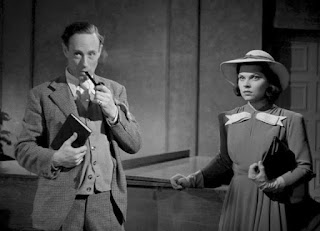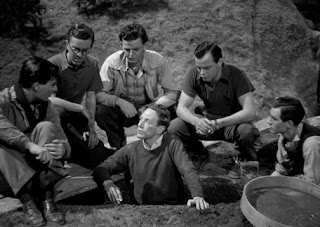Directed and produced by Leslie Howard
In the months before the opening of the Second World War, the security organs of Nazi Germany are vexed and angered by a shadowy figure whisking some of their most prestigious victims from their grasp. Little can they guess that their opponent is a nondescript university professor (Leslie Howard), and the German minister of propaganda, General von Graum (Francis Sullivan) himself, has set himself the task of ridding the Third Reich of this enemy, and the contest proves to be a showdown between good and evil.
From the title to the premise, the movie is clearly an updated re-make of another excellent Howard movie, The Scarlet Pimpernel (1934), based on the novels of Baroness Orczy, about an English aristocrat risking his life to aid victims of French revolutionary terror. But Pimpernel Smith stands on its own, not just for the different situations and the then current enemy, but for its message.
Firstly, to the actors. There is no better Pimpernel, whether Scarlet or Smith, than Howard. He seemed to embody the English spirit of the times, apparently effete but indefatigable when roused to battle and, indeed, he was a leading light of the British propaganda fight during the war, abandoning his Hollywood career – his rôle in Gone With the Wind was notable – to return to his homeland at the start of the conflict.
His performance here is perfectly on-target. Professor Horatio Smith is vague and absent-minded (a different but similar disguise than had The Scarlet Pimpernel’s Sir Percy Blakeney, who pretended to be a supercilious, superficial fop); Howard convinces the audience easily that he could be that and the constantly-thinking and courageous hero Smith really is. Howard was an actor whose expressions, almost identical to each other, could convey a variety of meanings, and he could make them plain to the audience.
Sullivan was an inspired choice as the principal villain. His immense girth is meant undoubtedly to remind one of Herman Göring, who, among other positions, was head of the German Air Force. (Though a Gestapo officer, Graum is shown always in uniform, no doubt for the overwhelming effect; the Gestapo, being a detective police force, did not wear uniform.) Like Göring, Graum seems almost charming at times, but, also like the real Nazi, there is barbarity and brutality beneath. Sullivan shows both sides of his character as well as Howard does his; he also persuasively endows it with something that is almost like light-heartedness at times, which is not out of place.
The other actors are not as necessary for their parts, though they all do a good job. David Tomlinson has a small rôle as one of Smith’s students, and Michael Rennie plays a concentration camp officer. Roland Pertwee takes the part of a diplomatist, Smith’s brother; this Pertwee also co-wrote the movie’s ‘scenario’ and was father to actor Jon and writer Michael Pertwee. Mary Morris is adequate as the female lead.
The story and the script are as important as the hero and villain, and are exemplary. They are what really contrast Pimpernel Smith from The Scarlet Pimpernel. There is a message here: brains, thought, reason, will always triumph over brawn and brute force, though the latter may have the apparent advantage. This is reinforced in the casting of the leads: Sullivan’s physical presence seems to overawe the almost weedy Howard.
Indeed, the script takes the story’s message and shows it at every opportunity. Smith’s intention to those he helps is signaled by a written phrase denoting the unlimited potential of the mind. Perhaps knowing he can’t save a million, Smith assists those whose intellect will benefit mankind – scientists, writers, artists – and states explicitly that progress and civilisation depend on such people. Even Smith’s career – that of an archaeology professor – reflects the importance of the brain.
There is a rather extraordinary short speech given at the movie’s climax in which Smith describes the inevitable destruction of those who embark on destruction themselves. Like a murderer who must continue to kill to cover his initial crime, they must go on from one atrocity to another; there is no turning back, as there is nothing left on which to build a nation. Words such as these show that Pimpernel Smith wanted to say something, and in so doing, the film becomes more than just the tale of a dashing hero coming to the rescue.
The script also provides unexpected humour and irony. Smith had discovered an ancient Greek statue, and he was smitten with the beauty of the woman in marble. Howard had starred in Pygmalion (1938), an adaptation of the Shaw play inspired by the story of a sculptor’s love for his creation. At an embassy ball, a lady tells Smith that people have remarked on her resemblance to the famous statue; Smith responds that he cannot comment, as the statue is nude…
There are other elements, less fundamental but important. The means by which Smith effects his successful adventures are never shown or described. This may seem a cop-out, but in fact give the character a significant mystique. A magician’s trick becomes mundane when explained, and the illusion is ruined. Pimpernel Smith is not a caper film; if it were, such omissions would blight the movie. Smith’s rescues are about the effect, not the cause.
Flaws exist. The band of students that Smith takes on as helpers, albeit reluctantly, might be seen as liabilities to such ventures, especially the enthusiastic Maxwell (Hugh McDermott). Then again, they had originally been recruited as window-dressing.
A fine adventure film, Pimpernel Smith carries a message that doesn’t overwhelm the plot. Nor does it negate the movie’s entertainment value, which is considerable. There is much to see and hear, and all of it is very good.













An appropriate movie for this time of Remembrance. Thanks for sharing.
ReplyDeleteLeslie Howard was an interesting actor. It seems a bit unfair that his most famous role, in GWTW, was one of his least notable characters. Ashley Wilkes was such an irritating little twerp.
ReplyDeleteThe cost of coming to the U.S. In Britain, Howard could make his own roles; indeed, his own movies, as was the case with “Pimpernel Smith”. I have no evidence of this, but I suspect he was happier making movies in Britain, too.
Delete